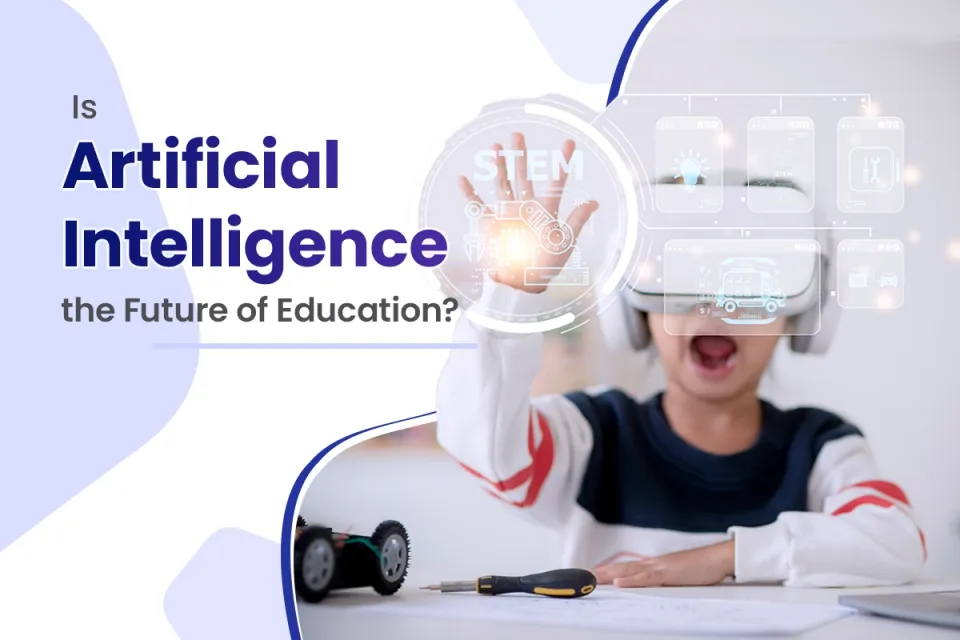The Future of Learning: AI's Role in Education

Introduction
Artificial Intelligence (AI) is revolutionizing various aspects of our lives, and education is no exception. With the potential to enhance teaching methods, personalize learning experiences, and provide valuable insights into student performance, AI has a significant role to play in the future of learning. Over the last several years, we have seen enormous advances in artificial intelligence. technologies such as machine learning and natural-language processing, making it increasingly feasible for education systems to incorporate intelligent systems into their classrooms. This essay explores how A.I.'s role in education can transform the way we learn and prepare ourselves for a rapidly evolving world.
Enhancing Teaching Methods

Traditionally, teachers have been responsible for imparting knowledge through lectures and classroom discussions. However, with the introduction of AI, educators can leverage innovative tools like intelligent tutoring systems (ITS) to augment their teaching methods. ITS utilizes machine learning algorithms to provide personalized instruction based on student's individual needs and learning styles.
By analyzing vast amounts of data about student performance patterns and preferences, AI-powered tutoring systems can adapt content delivery accordingly. For instance, if a student struggles with certain concepts or exhibits specific misconceptions repeatedly detected by AI, the system can generate customized explanations tailored to address those gaps effectively.
Moreover, virtual reality (VR) simulations powered by artificial intelligence offer immersive educational experiences beyond what traditional textbooks or lectures could provide alone. Students can explore historical events or scientific phenomena firsthand through interactive VR environments facilitated by intelligent algorithms.
Personalized Learning Experiences

One-size-fits-all approaches fail to cater adequately to each learner's unique abilities and interests effectively; however, they have persisted due to practical constraints faced by teachers handling large class sizes. With AI, personalized learning experiences become more attainable than ever before because intelligent algorithms can analyze individual student data at scale without overwhelming instructors.
Adaptive learning platforms, for example, harness the power of AI to assess students' strengths and weaknesses in real-time. These platforms generate personalized learning paths for each student by identifying knowledge gaps and suggesting appropriate resources or activities to address them.
Furthermore, natural-language processing algorithms enable intelligent chatbots to engage in meaningful conversations with learners. These chatbots can answer questions, provide explanations, and offer guidance on various subjects at any time. By leveraging these technologies effectively, students receive tailored support throughout their educational journey.
Data-Driven Insights

A.I.'s role in education extends beyond improving teaching methods and personalizing learning experiences; it also empowers educators with valuable insights into student performance through data analysis. By collecting vast amounts of data about student interactions with educational materials and assessments, AI-driven systems can identify patterns indicative of effective learning strategies or areas requiring additional attention.
These insights can help educators make informed decisions about curriculum design, instructional techniques, and individualized interventions. For instance:
1) Identifying which topics pose challenges for most students allows teachers to allocate more time or resources accordingly.
2) Recognizing common misconceptions provides opportunities for targeted instruction to address those gaps.
3) Analyzing engagement levels during different types of activities helps optimize content delivery preferences.
Additionally, AI-powered assessment tools streamline grading processes by automating tasks such as multiple-choice question evaluations or essay scoring—freeing up instructors' time for more valuable feedback provision.
Ethical Considerations

While acknowledging the potential benefits of AI's integration into education systems, we must remain mindful of ethical considerations surrounding its use:
1. Privacy: Student data is a critical aspect when utilizing artificial intelligence in education. Appropriate measures need implementation to ensure the security and confidentiality of sensitive information collected from learners.
2. Equity: Ensuring equitable access to A.I.-based educational tools is essential so as not to widen existing achievement gaps among underserved populations.
3. Algorithmic Bias: Developers must be vigilant in preventing biases from being encoded into A.I. systems, as these biases could perpetuate discrimination or reinforce existing inequalities.
Wind Up Thoughts
The future of learning is undoubtedly intertwined with the integration of artificial intelligence in education. From enhancing teaching methods to personalized learning experiences and data-driven insights, AI's potential impact on education is vast. Educators and policymakers should embrace these technological advancements responsibly by addressing ethical considerations while ensuring equitable access for all learners. By harnessing the power of A.I., we can create a more effective and inclusive educational landscape where every student has the opportunity to thrive and succeed in a rapidly evolving world.
